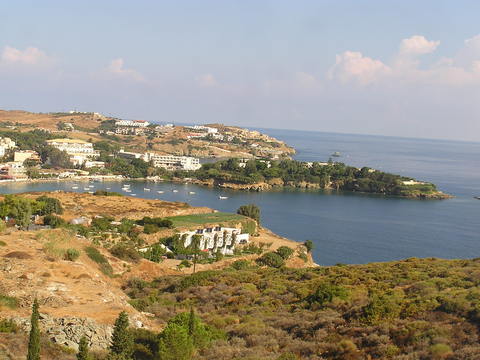
Mediterranean Committee
Coordination: Francisco Moreira
Members:
Linda Olsvig-Whittaker Israel Nature and Parks Authority
Kristijan Civic ECNC
Vania Proença Inst. Superior Tecnico
Cibele Queiroz Stockholm University and University of Lisbon
Francisco Moreira University of Porto
Dina Zografou University of Ioananina, Greece
Martina Temunovic Faculty of Forestry and Association Biom, Croatia
Tamara Kirin University of Tuscia, Italy
Dario Massimino British Trust for Ornithology, UK
Masa Frleta Valic Biology Students Association - BIUS, Croatia
Carlo Rondinini Rome
Bertrand Schatz CEFE, CNRS, Montpellier
Stefan Schindler University of Vienna, Austria
Goals and recommendations of the 'ad-hoc working group for Mediterranean conservation'
Defined at a meeting held under the 3rd ECCB-conference, Glasgow, UK,
1st of September, 2012
Concerning
RESEARCH PRIORITIES AND ENABLING ACTIONS FOR CONSERVATION OF THE MEDITERRANEAN AREAS OF THE "OLD WORLD"
Notes compiled by Stefan Schindler and Linda Olsvig-Whittaker

Mediterranean landscapes and ecosystems in the old world are characterized by long and strong human impacts and a high natural, socio-economic and political diversity. They harbor high levels of biodiversity and are often depending on human management. The variable and biodiverse Mediterranean landscapes are an important global heritage and often understudied. Due to the political heterogeneity in the European, Asian and African countries bordering the Mediterranean Sea, common efforts in conservation research and implementation are urgently needed. Regional differences, similarities and synergies should be evaluated. Within this context, the participants of the meeting place high priority on enabling actions (see below) and research to:
- harmonize research protocols, indicators, monitoring and modeling approaches for Mediterranean biodiversity;
- systematically survey the flora and fauna of understudied marine and coastal regions, such as large parts of the East-Adriatic and the North-African coast;
- assess and map demand and supply of ecosystem services, focusing particularly on topics that are specific to the Mediterranean such as the importance of fire as driver of ecosystem functioning, and the high demand/supply-ratio for freshwater;
- assess the effects of climate change on the distribution, phenology and interactions of species, and on ecosystem functions and services and their variation across Mediterranean landscapes;
- assess the current distribution of invasive alien species, monitor their spread, assess their impact on ecosystem functioning, and characterize the major mechanisms determining invasions and their interaction with other aspects of global change;
- increase the proportion of Mediterranean studies on agricultural landscapes and their management as European conservation policies are currently strongly biased towards evidence from northwestern Europe;
- assess biodiversity, ecosystem functioning, ecosystem service provision and management option for Mediterranean grassland ecosystems;
- assess the feasibility and the ecological and socio-economic consequences of rewilding marginal agricultural areas where the potential for native habitat restoration is particularly high;
- assess the effectiveness of currently applied conservation actions across the Mediterranean region and test options that could maximize their efficiency;
- assess drivers of human behavior and assess how human behavior might be changed towards a higher level of environmental, social and economic sustainability.
Enabling actions: During the workshop we discussed several enabling actions for the accomplishment of these goals and for enhancing conservation research and implementation in the Mediterranean. We agreed on the following priority actions:
- encourage the development of a high-profile scientific journal. This aim should be reached preferably by enforcing the already existing Journal of Mediterranean Ecology.
- increase access of Mediterranean researchers and practitioners to relevant literature. Preferred publishing in open-access journals would be an option to increase the availability of scientific information for Mediterranean target audiences.
- compile freely accessible databases on (i) national experts across the Mediterranean which can be contacted for specific expertise and cooperation regarding conservation issues in their country, (ii) primary biodiversity data and important environmental variables including invasive alien species and their invasion history (GBIF and DAISIE might provide support), (iii) conservation knowledge that should go beyond scientific literature and contain also local expert knowledge and traditional knowledge.
- enhance the cooperation across the Mediterranean basin by enforcing scientific societies, facilitating cooperation meetings, joint workshops, exchange visits, and application of the European FP program for cooperation and capacity building (especially with Asiatic and African parts of 'old world'-Mediterranean, but also with other Mediterranean areas of the world). Local student workshops and summer schools may be a good way to reach the conservation biologists in the countries of the Southern Mediterranean.
- find synergies with other Mediterranean –based organizations including ISOMED, the organizers of the MEDECOS conferences.
- implement a kick-off-conference of the "Ad-hoc working group for Mediterranean conservation" to work together on the most important tasks such as the identification of research priorities on a broader basis, form working groups and to seek funding. Carlo Rondini offered Sapienza University of Rome as a convenient venue.
- seek for startup funds for the working group, and the kick-off-conference.
>> Downloadable PDF of the above goals and recommendations <<
Mission:
Tasks for this new committee include identification of common themes, interests and goals, establishing research networks, and regional planning of conservation efforts. The Mediterranean ad hoc committee aims at becoming a bridge to the African, Asian and Marine Sections, and admits participation from members who are not in Europe, but do work in the Mediterranean region.
History:
This new Ad-Hoc committee focusing on conservation biology research in the Mediterranean region has been formed in 2010 (Board Meeting in Freiburg).
Context:
The Mediterranean basin is characterized by rainless summers, ancient cultures, and an ecological orientation towards the sea. Phenomena such as wildfire, anthropogenic landscapes, rapid urbanization, cultural landscape conservation, and a shared marine environment are common to conservation biologists in the region. EU funding agencies have long recognized these common interests; hence there are specific programs (such as MedWet and ENPI) which focus on multinational cooperation for conservation issues of mutual concern in the Mediterranean basin.